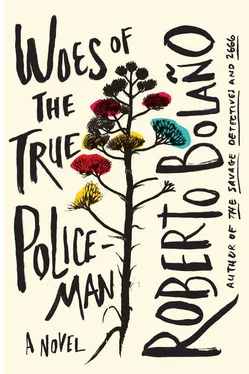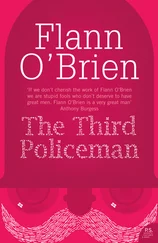Amalfitano often had nightmares. His dream (one in which Edith Lieberman and Padilla had Chilean elevenses with tea, buns, avocado, tomato jam made by his mother, rolls and homemade butter nearly the color of a sheet of Ingres-Fabriano paper) opened up and let in the nightmare. There, in those lonely latitudes, Che Guevara strolled up and down a dark corridor and in the background huge diamond-crusted glaciers shifted and creaked and seemed to sigh as at the birth of history. Why did I translate the Elizabethans and not Isaac Babel or Boris Pilniak? Amalfitano asked himself, disconsolate, unable to escape the nightmare but still holding scraps of the dream (beyond the glaciers the whole distant horizon was Edith Lieberman and Padilla having their delicious elevenses) in his empty, frozen, nearly transparent hands. Why didn’t I slip like Mighty Mouse through the bars of the Lenin Prizes and the Stalin Prizes and the Korean Women Collecting Signatures for Peace and discover what was there to be discovered, what only the blind couldn’t see? Why didn’t I stand up at one of those oh-so-serious meetings of leftist intellectuals and say the Russians the Chinese the Cubans are making a fucking mess of things? Why didn’t I stand up for the Marxists? Stand up for the pariahs? March in step with history while history was being born? Offer silent assistance at its birth along the way? Somehow, Amalfitano said to himself from the depths of his nightmare, his tone scholarly and his voice unrecognizably hoarse, masochist that I am, I blame myself for crimes that were never committed: by 1967 I had already been expelled from the Chilean Communist Party, my comrades had run me down and turned me out, I was no longer well liked. Why do I blame myself, then? I didn’t kill Isaac Babel. I didn’t destroy Reinaldo Arenas’s life. I wasn’t part of the Cultural Revolution and I didn’t sing the praises of the Gang of Four like other Latin American intellectuals. I was the simple-minded son of Rosa Luxemburg and now I’m an old faggot, in each case the object of mockery and ridicule. So what do I have to blame myself for? My Gramsci, my situationism, my Kropotkin (lauded by Oscar Wilde as one of the greatest men on earth)? For my mental hang-ups, my lack of civic responsibility? For having seen the Korean Women Gathering Signatures for Peace and not stoning them? (I should have buggered them, thought Amalfitano from the whirl of glaciers, I should have fucked those fake Koreans until their true identity was revealed: Ukrainian Women Gathering Wheat for Peace, Cuban Women Gathering Cockles in an Unremitting Latin American Twilight.) What am I guilty of, then? Of having loved and continuing to love — no, not of loving: of longing. Of longing for the conversation of my friends who took to the hills because they never grew up and they believed in a dream and because they were Latin American men, true macho men, and they died? (And what do their mothers, their widows, have to say about it?) Did they die like rats? Did they die like soldiers in the Wars of Independence? Did they die tortured, shot in the back of the head, dumped in the sea, buried in secret cemeteries? Was their dream the dream of Neruda, of the Party bureaucrats, of the opportunists? Mystery, mystery, Amalfitano said to himself from the depths of the nightmare. And he said to himself: someday Neruda and Octavio Paz will shake hands. Sooner or later Paz will make room on Olympus for Neruda. But we will always be on the outside. Far from Octavio Paz and Neruda. Over there, Amalfitano said to himself like a madman, look over there, dig over there, over there lie traces of truth. In the Great Wilderness. And he said to himself: it’s with the pariahs, with those who have nothing at all to lose, that you’ll find some justification, if not vindication; and if not justification, then the song, barely a murmur (maybe not voices, maybe only the wind in the branches), but a murmur that cannot be silenced.
The root of all my ills, thought Amalfitano sometimes, is my admiration for Jews, homosexuals, and revolutionaries (true revolutionaries, the romantics and the dangerous madmen, not the apparatchiks of the Communist Party of Chile or its despicable thugs, those hideous gray beings). The root of all my ills, he thought, is my admiration for a certain kind of junkie (not the poet junkie or the artist junkie but the straight-up junkie, the kind you rarely come across, the kind who almost literally gnaws at himself, the kind like a black hole or a black eye, with no hands or legs, a black eye that never opens or closes, the Lost Witness of the Tribe, the kind who seems to cling to drugs in the same way that drugs cling to him). The root of all my ills is my admiration for delinquents, whores, the mentally disturbed, said Amalfitano to himself with bitterness. When I was an adolescent I wanted to be a Jew, a Bolshevik, black, homosexual, a junkie, half-crazy, and — the crowning touch — a one-armed amputee, but all I became was a literature professor. At least, thought Amalfitano, I’ve read thousands of books. At least I’ve become acquainted with the Poets and read the Novels. (The Poets, in Amalfitano’s view, were those beings who flashed like lightning bolts, and the Novels were the stories that sprang from Don Quixote) . At least I’ve read. At least I can still read, he said to himself, at once dubious and hopeful.
Amalfitano hardly ever thought about old age. Sometimes he saw himself with a cane, strolling along a bright tree-lined boulevard and cackling to himself. Other times he saw himself trapped, without Rosa, the curtains drawn and the door propped shut with two chairs. We Chileans, he said to himself, don’t know how to grow old and as a general rule we make the most terrific fools of ourselves; ridiculous as we are, though, there’s something courageous about our old age, as if when we grow wrinkled and fall ill we recover the courage of our rugged childhoods in the land of earthquakes and tsunamis. (Though what Amalfitano knew about Chileans was only supposition, considering how long it had been since he’d associated with any of them.)
In one of his classes, Amalfitano said: the birth of modern Latin American poetry is marked by two poems. The first is “The Soliloquy of the Individual,” by Nicanor Parra, published in Poemas y antipoemas , Editorial Nascimento, Chile, 1954. The second is “Trip to New York,” by Ernesto Cardenal, published in a Mexico City magazine in the mid-’70s (1974, I think, but don’t quote me on that), which I have in Ernesto Cardenal’s Antología , Editorial Laia, Barcelona, 1978. Of course, Cardenal had already written “Zero Hour,” “Psalms,” “Homage to the American Indians,” and “Coplas on the Death of Merton,” but it’s “Trip to New York” that to me marks the turning point, the definitive fork in the road. “Trip” and “Soliloquy” are the two faces of modern poetry, the devil and the angel, respectively (and let us not forget the curious fact — though it may be rather more than that — that in “Trip” Ernesto Cardenal mentions Nicanor Parra). This is perhaps the most lucid and terrible moment, after which the sky grows dark and the storm is unleashed.
Those who disagree can sit here and wait for Don Horacio Tregua, those who agree can follow me.
Notes from a Class in Contemporary Literature: The Role of the Poet Happiest : García Lorca.
Most tormented : Celan. Or Trakl, according to others, though there are some who claim that the honors go to the Latin American poets killed in the insurrections of the ’60s and ’70s. And there are those who say: Hart Crane.
Читать дальше








![О Генри - Бляха полицейского О’Руна [The Badge of Policeman O'Roon]](/books/405347/o-genri-blyaha-policejskogo-o-runa-the-badge-of-po-thumb.webp)



